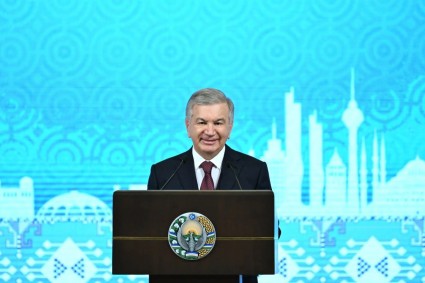The tireless August sun was still on the horizon when Bobomurod Abdullayev left his Bishkek apartment. He had little to do in those days. The pandemic had trapped him in Kyrgyzstan, where he had attended a course for journalists and former political prisoners at the American University of Central Asia.
He passed a grocery store and thought that he should do some shopping to fill his empty fridge. He would go there later, he decided, after getting take-out from a local restaurant.
But he never made it to the restaurant. Two men approached him in the street and asked him to come with them. Dressed in plain clothes, they didn’t introduce themselves. But Abdullayev could tell a security services agent when he saw one. He let the men lead him to a car and they drove to the headquarters of the State Committee for National Security, Kyrgyzstan’s intelligence agency.
Once there, Abdullayev found out that the security services were arresting him at the request of Uzbekistan’s government. His home country believed that he was the author of the anonymous and infamous Qora Mergan blog, which had become a thorn in the side of the Uzbek authorities.
Qora Mergan’s posts were so outrageous that Uzbekistan decided to put the author on trial for attempting to overthrow the president (Article 158 of the Criminal Code) and the constitutional regime (Article 159). Both crimes are punishable with up to 20 years of imprisonment.
This was not the first time that the security services had gone after Abdullayev.
In 2017, he was arrested when the authorities learned that he was the author of a series of daring articles shedding light on the crimes of Islam Karimov’s regime, which he wrote under the pseudonym of Usman Haqnazarov. Karimov had died in the fall of 2016 and was succeeded by his longtime prime minister, Shavkat Mirziyoyev.
Abdullayev spent eight months in prison, after which he was freed but nevertheless had to pay 20 percent of his salary to the state for two years.
Over the past four years under President Mirziyoyev, Uzbekistan has been on a path to reform. The new ruler granted more space for citizens to voice their concerns and grievances. Social media platforms, many of which had been blocked, were made available to the surprise and joy of Uzbekistan’s population, and were many foreign news sites. New bloggers and websites mushroomed to fill in the gap in the country’s desolated media space. Social media, in particular, has become a public square that allows to people to discuss openly the social and political issues of the day.
But four years into Mirziyoyev’s reforms, freedom of speech in Uzbekistan is far from a given. While the president has repeated on numerous occasions that journalists and bloggers should be free to criticize those in power, and improvements have been noted, Uzbekistan continues to languish at the bottom of many freedom of speech rankings.
According to the Reporters Without Borders’ World Press Freedom rating, in 2020 Uzbekistan ranked at 156th place in the world (it was 166th in 2016), while Freedom House continues to label the country as “not free,” with a score of 10 out of 100 in 2020 (its score in 2017 was 3 out of 100).
In September, during an online Organization for Security and Co-operation in Europe (OSCE) conference marking the International Day for Universal Access to Information, Komil Allamjonov, chairman of the Board of Trustees of the Public Foundation for Support and Development of National Mass Media in Uzbekistan, commented on the country’s continuously low rankings.
“From 2017 to 2020 it rose by 13 positions. But are there any problems? Of course there are. Do journalists and bloggers have no fear? Of course they do, otherwise the results would have been better. Censorship of certain people, self-censorship of journalists and bloggers, threats or pressure from government officials – naturally, such factors still exist and we are fighting them,” he said.
“These days, at the order of the president, another important document is to be adopted, that is a law aimed at increasing the responsibility for obstructing the activities of the media and putting pressure on journalists. We are waiting for this. We understand that we are still at the beginning of the path and that there will be mistakes and shortcomings along the way.”
Mistakes, unfortunately, are not infrequent. Criticizing the rich and powerful all too often results in increased pressure or threats from officials, petty thugs or the security services.
In September, due to threats, video blogger Shavkat Egamberdiev was forced to remove a satirical video that allegedly offended the reputation of Artel and Akfa, companies founded by the mayor of Tashkent, Jakhongir Artykhodjaev. In November 2019, the mayor was recorded threatening journalists with public embarrassment (“I’ll put you in a gay taxi and in six seconds and you’re done!”) and physical violence (“Leave the house for two or three days without any reason, and you will be gone”).
Outside of Tashkent, the situation is even more grim. In August, the authorities of the autonomous republic of Karakalpakstan summoned a journalist in the middle of the night for reporting on the death of the republic’s chairman, which was officially announced days later. The same month, a blogger from the Uzbek exclave of Sokh was transported to the Fergana region with a hood over his head for calling for the ousting of Fergana’s long standing mayor, Shukhrat Ganiev. Only weeks later, the official was appointed as deputy prime minister.
Some cases have taken a more curious path than others.
Following two weeks in detention in Kyrgyzstan, during which Abdullayev was not allowed to see his lawyer or appeal the extradition order, he was sent back to Uzbekistan.
“They passed me over to the Uzbek security services. There were people with cameras who asked if I had any complaints and I said that I do, that my lawyer was not allowed to see me, that they didn’t let me write an appeal, that they strangled me. I wrote a quick complaint,” says Abdullayev.
“They put me on a military plane. But the Uzbeks did not handcuff me. They were nice, they spoke to me in a respectful way. I thought they would beat me up on the plane but they didn’t. We landed in Tashkent, they drove me to the security services’ office and called my lawyer. They interrogated me and after that they let me go.”
By the time, most of Abdullayev’s possessions had already arrived at his Tashkent address, with the notable exception of his phone and laptop.
Soon after his arrest it became clear that Abdullayev was not the author of the Qora Mergan blog. The government critic continued his crusade, publishing new posts while Abdullayev was in jail. But for a number of weeks it was unclear what would happen to him. In the end, Abdullayev was cleared of all charges and in mid-October, in a remarkable turn of events, he was given a three-room apartment from the president – a consolation price for his suffering, or a desperate attempt by the Uzbek authorities to save face following a grotesque crusade against a journalist.
“Maybe someone from the security services wanted to prove himself in front of the president, show that they have found the villain. Show how professional and quick they are,” Abdullayev said.
Not all cases, however, end as well as Abdullayev’s, and the coronavirus pandemic has only exposed the fragility of freedom of speech in Uzbekistan. In March, the government introduced new legislative amendments against spreading panic and disseminating false information about the coronavirus, both punishable with up to three years of imprisonment.
In early May, apparently due to construction errors, the Sardoba dam in the Sirdaryo region burst. The ensuing flooding displaced 100,000 people in both Uzbekistan and Kazakhstan. Anora Sodykova, a reporter with the state-run Uza.uz news agency, went to investigate the situation, to talk to the affected people. It left her in shock. People who had lost everything in the flood repeatedly expressed thanks to the president for his willingness to compensate them for their losses.
Distraught, Sodykova wrote a post on Facebook expressing her anger over the situation.
“Who are we? What sort of people are thanking the government before anything has been done? For barely getting bread with butter,” her post read. It soon went viral.
“My editor called me and asked to remove my post. I said that I would not do that, that people’s reaction was a result of the past twenty years. I have nothing against Mirziyoyev,” Sodykova said.
Several days later, she learned that she had been dismissed.
“I wrote on Facebook that Hayriddin Sultanov (the president’s speechwriter) has fired me. Our relationship was tense from the beginning and only he could influence the decision of my editor. I got reliable information that it was him,” she said. “I gave an interview to the BBC and many people shared my post, even MPs. People supported me, they said that journalists should not be fired for Facebook posts.”
Following her second post, the pressure increased. Some people began to call her introducing themselves as tax office employees and asking about a business she had closed years earlier. Soon after, threats followed. Her husband, a pious Muslim, began receiving phone calls from people threatening him with imprisonment for his alleged support of radical Islamist movements. They made it clear that living under one roof with his wife had become dangerous. Sodykova’s husband could not stand up to the pressure. He left her and took their son with him.
In the end, Sodykova agreed to publicly apologize and she got her job back. But the feeling of injustice did not leave her.
Other methods of pressure are more indirect. As several journalists have told The Diplomat, companies owned by business moguls have been organizing events for journalists and bloggers to influence their reporting with nice treatment and gifts. Others have run old school troll factories out of local universities to violently condemn posts about their bosses’ wrongdoings.
But despite the pressures, some processes are impossible to halt.
“The public used to be afraid to give comments to the media. Now, when they see you with a camera, they are eager to talk. There is still fear among journalists and self-censorship is common, but it will soon be impossible to pressurize media workers because if something happens, people react immediately,” says Darina Solod, a journalist and editor-in-chief of Hook.report.
“Society has changed and no one can control the flow of information. They can try to block Facebook, but people know how to bypass it. They can try to turn back time to the Karimov era – but it will not work.”
Agnieszka Pikulicka-Wilczewska is a journalist focusing on the post-Soviet space.















